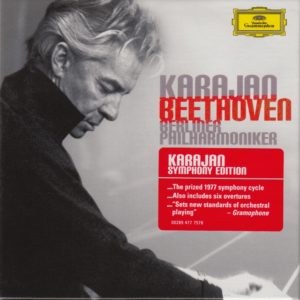
My listening post this morning is Baker Book House, the largest theological book store in the Midwest. This is an amazing place to work, get coffee, eat a scone, and browse rows and rows and rows and rows of books, especially used books.
Anyway, here I am listing to Austrian conductor Herbert von Karajan (1908-1989), the Berliner Philharmoniker, and Beethoven’s Symphony No. 7 in A major.
 I’ve encountered Maestro Karajan six times previously in his legendary 1977 cycle, on…
I’ve encountered Maestro Karajan six times previously in his legendary 1977 cycle, on…
Day 11. Rating: “Meh!”
Day 29. Rating: “Huzzah!”
Day 47. Rating: “Huzzah!”
Day 65. Rating: Almost “Huzzah!”
Day 83. Rating: “Huzzah!”
Day 101. Rating: “Meh!”
Let’s see…that’s three “Huzzah!” and two “Meh!” ratings.
What will today bring?
I’ll soon find out.
And I’ll find out without the Cult of Karajan (aka Karajan Worship Syndrome) influencing me in any way.
 Beethoven wrote his symphonies in four parts (except for the Sixth, which is in five). The time breakdown of this particular one (Symphony No. 7 in A major), from this particular conductor (Karajan, at age 67-69) and this particular orchestra (Berliner Philharmoniker), at this particular time in history (1975-1977) on this particular record label (Deutsche Grammophon) is as follows:
Beethoven wrote his symphonies in four parts (except for the Sixth, which is in five). The time breakdown of this particular one (Symphony No. 7 in A major), from this particular conductor (Karajan, at age 67-69) and this particular orchestra (Berliner Philharmoniker), at this particular time in history (1975-1977) on this particular record label (Deutsche Grammophon) is as follows:
I. Poco sostenuto – Vivace……………………………..11:25
II. Allegretto………………………………………………………7:57
III. Presto – Assai meno presto (trio)……………….7:28
IV. Allegro con brio…………………………………………..6:25
Total running time: 33:05
My Rating:
Recording quality: 5 (rich, lush, and dynamic – well recorded, powerful)
Overall musicianship: 5 (the musicians sound inspired, energized, joyful)
CD liner notes: 4 (slimmer booklet compared to the 1963 cycle, but no less interesting…a missing, but necessary, piece of information: when, exactly, was this recorded? Which day? Which year? Providing a range of 1975-1977 isn’t sufficient for inquiring minds like mine)
How does this make me feel: 4 (“Meh!”)
I’m not sure what to think of today’s performance of Beethoven’s Seventh.
I know I always complain if a performance seems to lack reckless abandon, a joyful energy that seems to defy boundaries. A breakout performance. Not by the numbers.
Well, this performance has some of those qualities. But it seems too reckless, too energetic, too brisk of a tempo.
For example…
Movement I seems the most well balanced between measured and reckless. Some parts are subtle. Others are bold and brash. I liked Movement I.
However, my beloved Movement II (“Larhetto”) was played too quickly. I wasn’t feeling the weight of emotion, the somberness, the subtlety. It sounds hurried.
Movement III (“Scherzo”) is better than the second movement. But that’s not a good thing since the second movement is my favorite. If any movement was going to shine, for me, it would be the second. Alas.
Movement IV (“Allegro Molto”) sounds like the hounds of hell are chasing the musicians. Fast, fast, fast.
Maybe the tempo is part of the reason why the running time is five minute or so less than other performances I’ve heard. Its energetic, all right. But almost too much so.
This is a fantastic recording. The orchestra sounds amazing. Well rounded, powerful, yet nimble. They certainly had their coffee that day. Energy to burn. Kudos so the recording engineers. This is a spectacular achievement.
But, as I mentioned before, it sounds like the equivalent of an actor looking like he/she is acting. I’m hearing the Berliner Philharmoniker. But i”m not necessarily hearing Beethoven’s Seventh.
For sheer recording quality I’d give this a five. It’s an amazing performance – if you like a breakneck pace, the feeling you get if you’re in a bobsled whipping down a mountain.
But if you want to hear Beethoven’s Seventh, I suggest choosing another performance from a different conductor. This performance is solid, and has its moments of inspiration. But the tempo irritates on me.
“Meh!”
